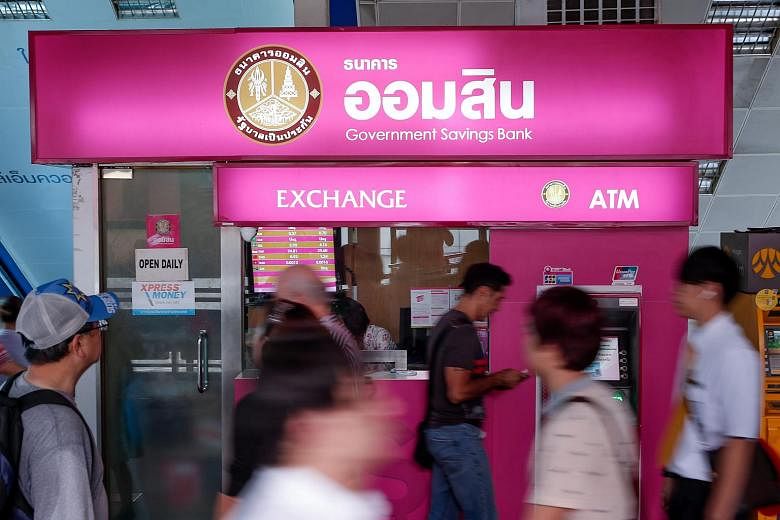WELLINGTON (BLOOMBERG) - Thailand's baht drove further losses among Asian emerging-market currencies after a deadly bombing in Bangkok and a selloff in commodities. Oil maintained declines at a six-year low, while stocks in the region climbed for the first time in three days.
The baht slipped as much as 0.8 per cent to 35.648 per US dollar on Tuesday (Aug 18), its weakest intraday level since April 23, 2009. It was down 0.4 per cent to 35.523 by 10:59 am in Tokyo.
The baht also weakened against the Singapore currency, trading at 25.27 to the Singdollar at about 11:15am on Tuesday, down from Monday's close of 25.09.
The blast that killed at least 19 people in the Thai capital adds to pressure on the baht as China's shock devaluation of the yuan and the prospect of higher US interest rates spur a general retreat from emerging-market assets.
"There's a worrying combination of negative fundamentals and a looming Fed hike which is an echo of 1997 and 1998," Michael Every, head of financial markets research at Rabobank Group in Hong Kong, said by phone.
"The Bangkok bombing last night didn't help sentiment. While most Asian countries and currencies are coming under downward pressure because of what the Fed's doing, their own economies are so weak that they're quite happy to allow the currencies to weaken."
The Thai bombing took place in the capital's central shopping district and Chinese and Filipino nationals were among the dead, according to the Ministry of Public Health. Defense Minister Prawit Wongsuwan said the perpetrators aimed to destroy Thailand's economy and tourism industry.
"The bombing just adds to the poor fundamentals of Thailand," said Sue Trinh, a senior currency strategist in Hong Kong at Royal Bank of Canada, citing weakening exports, high household debt, and the easing bias of the Bank of Thailand. "We stick to the call of being underweight the baht."
The ringgit, which has been battered by a political scandal and falling commodity prices, fluctuated after sliding to levels last seen during the Asian financial crisis in 1998. It's the worst-performing Asian currency the past month, sliding 7.7 per cent, almost double the loss incurred by Taiwan's dollar, the next-worst performer.
Indonesia's rupiah weakened 0.3 per cent, also trading at levels unseen for 17 years.
Developing-nation currencies on Friday capped their longest run of weekly declines since 2000 as the pullback in commodities hit the ringgit to the ruble and China's devaluation fueled concern over the outlook for the world's second-largest economy.
A gauge tracking 20 of the most-traded developing-nation currencies dropped 0.4 per cent Monday in a third straight day of declines.
China's offshore currency gained 0.2 per cent to 6.4356 per dollar in Hong Kong trading on Tuesday. The People's Bank of China has kept the yuan relatively stable in onshore trading this week after triggering its biggest drop in almost two decades last week. Goldman Sachs has lowered its forecasts for the yuan amid reports policy makers will resort to more monetary easing.
The Hang Seng China Enterprises Index advanced 1 per cent after its lowest close since Dec. 1 Monday. The Hang Seng Index rose 0.6 per cent, while the Shanghai Composite Index was little changed.
Japan's Topix index added 0.2 per cent, while Australia's S&P/ASX 200 Index increased 0.3 per cent. The Kospi index in Seoul dropped 0.1 per cent and New Zealand's S&P/NZX 50 Index added 0.2 per cent.
The Straits Times Index was up 0.3 per cent at 3,076.60 as at 10:25am.
In the commodities market, West Texas Intermediate crude was little changed at US$41.84 a barrel, its lowest price since 2009, after sinking 1.5 per cent Monday. Brent oil lost 0.2 per cent to US$48.65.
Data due Wednesday from the US government is projected to show the nation's oil inventories held above 90 million barrels, exceeding the five-year average for this time of year.
The Bloomberg Commodity Index returned to a 13-year low Monday, falling 0.6 per cent in a fifth day of losses.

